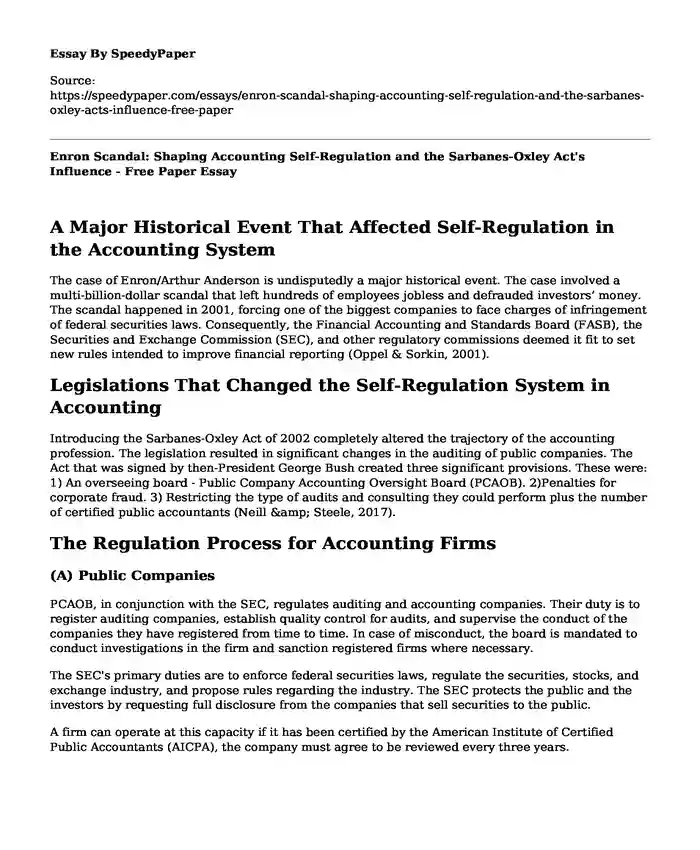
| Type of paper: | Essay |
| Categories: | Company Accounting |
| Pages: | 3 |
| Wordcount: | 688 words |
A Major Historical Event That Affected Self-Regulation in the Accounting System
The case of Enron/Arthur Anderson is undisputedly a major historical event. The case involved a multi-billion-dollar scandal that left hundreds of employees jobless and defrauded investors’ money. The scandal happened in 2001, forcing one of the biggest companies to face charges of infringement of federal securities laws. Consequently, the Financial Accounting and Standards Board (FASB), the Securities and Exchange Commission (SEC), and other regulatory commissions deemed it fit to set new rules intended to improve financial reporting (Oppel & Sorkin, 2001).
Legislations That Changed the Self-Regulation System in Accounting
Introducing the Sarbanes-Oxley Act of 2002 completely altered the trajectory of the accounting profession. The legislation resulted in significant changes in the auditing of public companies. The Act that was signed by then-President George Bush created three significant provisions. These were: 1) An overseeing board - Public Company Accounting Oversight Board (PCAOB). 2)Penalties for corporate fraud. 3) Restricting the type of audits and consulting they could perform plus the number of certified public accountants (Neill & Steele, 2017).
The Regulation Process for Accounting Firms
(A) Public Companies
PCAOB, in conjunction with the SEC, regulates auditing and accounting companies. Their duty is to register auditing companies, establish quality control for audits, and supervise the conduct of the companies they have registered from time to time. In case of misconduct, the board is mandated to conduct investigations in the firm and sanction registered firms where necessary.
The SEC's primary duties are to enforce federal securities laws, regulate the securities, stocks, and exchange industry, and propose rules regarding the industry. The SEC protects the public and the investors by requesting full disclosure from the companies that sell securities to the public.
A firm can operate at this capacity if it has been certified by the American Institute of Certified Public Accountants (AICPA), the company must agree to be reviewed every three years.
(B) Non-Public Companies
The State Board of Accountancy and the AICPA are the primary regulators of non-public accounting firms. The State Board of Accountancy is mandated to revoke licenses for firms that do not meet operation requirements. The AICPA, on the other hand, evaluates firms through quality evaluation and peer review programs. The two institutions are also in charge of investigating ethical violations by accounting firms for non-public organizations.
Effects of the New Self-Regulation Process on Auditors Working for Large Firms
Today, public accounting firms are held personally responsible and are at greater risk, especially when auditing public companies. PCAOB overseas performers of the accounting firms and a simple misstep in an accounting firm may lead to the revoking of their licenses. Ultimately, this means that the accounting firm may no longer be able to audit public companies. The regulations by the PCAOB on the companies initiate a domino effect where now the accounting firms have to be strict with their employees ensuring that they strictly go by the books when performing their everyday duties.
Advantages and Disadvantages of Self-Regulation of Accounting Firms
Self-regulation strengths include: First, there is personal accountability of audit, which ensures that investors and the public are protected. Secondly, it ensures efficiency for the accounting firm, which is beneficial to the consumers of the services. Self-regulation also fosters trust among the investors as they can be assured that the financial statements provided are reliable. Finally, the system is more flexible and ensures expedited rulemaking, monitoring, and enforcement compared to regulation by the government (Contessotto et al., 2019).
One major weakness of the self-regulation system is that, when auditing public companies, accounting firms may encounter higher risks that may jeopardize the firm (Contessotto et al., 2019).
References
Contessotto, C., Knechel, W. R., & Moroney, R. A. (2019). The Association between Audit Manager and Auditor-In-Charge Experience, Effort, and Risk Responsiveness. AUDITING: A Journal of Practice & Theory, 38(3), 121–147. https://doi.org/10.2308/ajpt-52308
Neill, B. M., & Steele, S. (2017, June 21). The Sarbanes-Oxley Act at 15: what has changed? EY. https://www.ey.com/en_us/public-policy/the-sarbanes-oxley-act-at-15-what-has-changed.
Oppel, R. A., & Sorkin, A. R. (2001, November 29). ENRON COLLAPSES AS SUITOR CANCELS PLANS FOR MERGER. The New York Times. https://www.nytimes.com/2001/11/29/business/enron-s-collapse-the-overview-enron-collapses-as-suitor-cancels-plans-for-merger.html.
Cite this page
Enron Scandal: Shaping Accounting Self-Regulation and the Sarbanes-Oxley Act's Influence - Free Paper. (2023, Dec 23). Retrieved from https://speedypaper.net/essays/enron-scandal-shaping-accounting-self-regulation-and-the-sarbanes-oxley-acts-influence-free-paper
Request Removal
If you are the original author of this essay and no longer wish to have it published on the SpeedyPaper website, please click below to request its removal:
- Product Analysis Essay Sample: Toyota Land Cruiser
- Essay Example: Description of Tesla's Industrial Sector and Sub-sector
- Ethical Challenges at Volkswagen Company, Free Essay Sample
- Risk Analysis of Nissan Corporation, Free Essay Example
- Essay Sample on Starbuck's Foreign Entry Strategy
- Paper Example: What Marketing Strategy Is Pepsi Using?
- Forensic Accounting Midterm - Free Report Example
Popular categories




